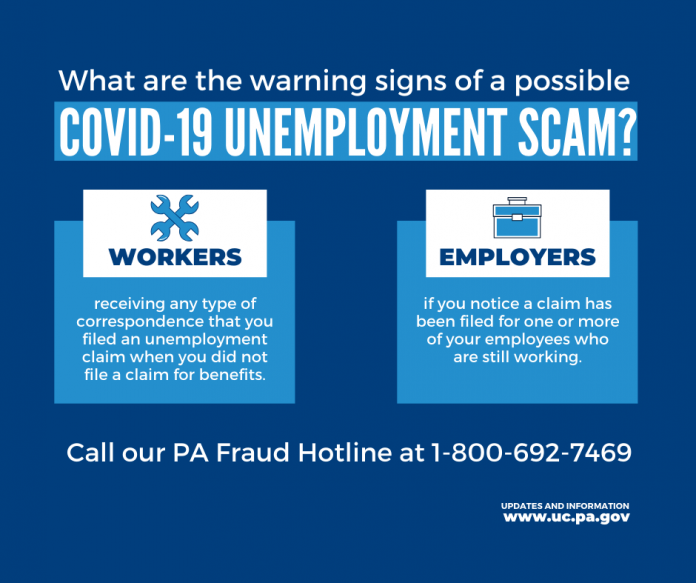Secretary Jerry Oleksiak announced the Pennsylvania Department of Labor & Industry is working closely with state and federal partners to monitor COVID-19 scams across the U.S. that are targeting unemployment benefits programs and their claimants.
“Unlike some other states, Pennsylvania is not seeing a large increase in unemployment scams since COVID-19 mitigation efforts began. We are working with our partner agencies to keep a close eye on the situation,” said Oleksiak. “Unfortunately, scammers often use times of crisis – like this pandemic – to take advantage of people and the programs that provide them with much needed assistance. We have many ways to prevent, identify and block fraud, but we also need your help.
“I urge Pennsylvania workers receiving unemployment benefits to be extremely vigilant about protecting your identity from theft. Make sure you know how to recognize and avoid scams. Employers should also be on the lookout for unemployment claims filed for any of your employees who are still working. If you suspect fraud, report it right away.”
Recognize and Avoid Scams
The scammers behind the COVID-19-related fraud appear to be using Social Security numbers and other personally identifiable information belonging to identity theft victims to commit unemployment compensation fraud. In many situations, the victims are unaware that their identity has been stolen.
Following are some warning signs of a possible COVID-19 scam:
– For workers – receiving any type of correspondence that you filed an unemployment claim when you did not file a claim for benefits
– For employers – if you notice a claim has been filed for one or more of your employees who are still working
In general, take these steps to protect yourself against unemployment scams:
– Never give out your personal information over email or text message
– Don’t wire money, and always ignore the following requests: communications related to your UC benefits from someone asking for money; someone who says they can help you file for your benefits for a fee; and anyone claiming to work for L&I who says they need a fee to complete your application
– Don’t open or respond to unsolicited emails or text messages
– Never give our your personal information on website or social media channels, especially those that claim they can help you apply for UC benefits; third parties can’t apply for your benefits
– Don’t trust or rely on UC info from unofficial websites; always visit uc.pa.gov for Pennsylvania unemployment program information
– L&I may need to call you; if you file a claim, save the following unemployment phone numbers to your phone so you know you’re receiving a legitimate call from L&I: 888-313-7284 (regular UC); 855-284-8545 (Pandemic Unemployment Assistance/PUA phone number)
L&I will ask for some personal identification information including the last four digits of your Social Security number, but will not ask for your full SSN.
Report Fraud
Report fraudulent activity regarding Pennsylvania’s UC benefits:
– Online
– Identity theft – if you suspect or know that someone is using your personal information such as your name, Social Security number, or date or birth without your knowledge or consent to file for UC benefits, complete and submit the Identity Theft Form
– Unemployment claims fraud – if you know of individuals who are collecting UC benefits illegally, including people who are working and not reporting their wage for PA UC benefit purposes; or people who cannot work due to an illness, disability or incarceration, complete and submit the Unemployment Claims Fraud Form
– Phone – 1-800-692-7469 (PA Fraud Hotline)
– Police – file a police report with the municipality you resided in at the time the unemployment benefits in question were paid; a copy of the police report must be provided to the Office of Unemployment Compensation
If you are a victim of identity theft, you may also report it to the Federal Trade Commission and start a recovery plan at identitytheft.gov.
What L&I is Doing
In addition to its regular methods of preventing, identifying and blocking scams, L&I is also:
– Cross matching data with other state agencies and across the country to detect fraud activity
– Working with the U.S. Department of Labor to prevent and detect any fraudulent activities related to UC


